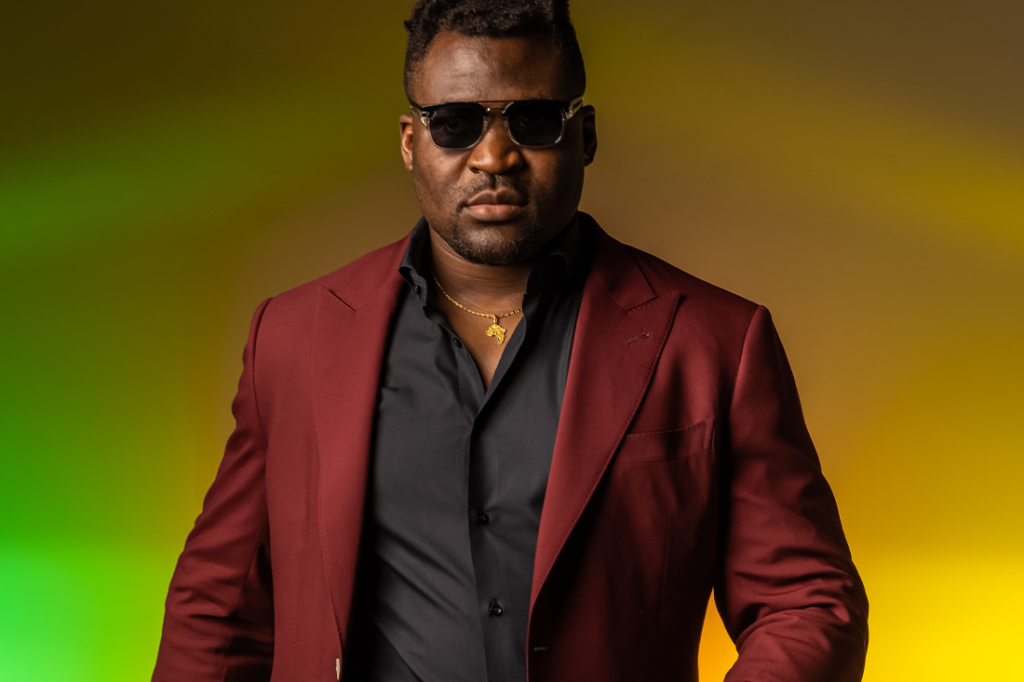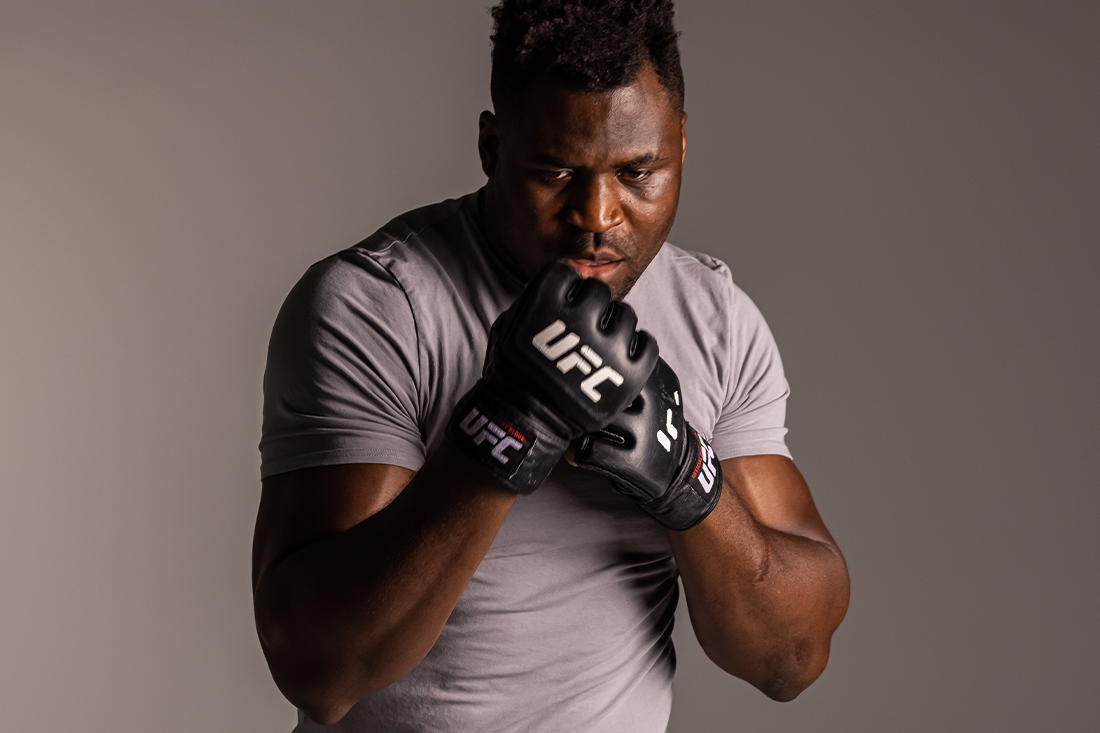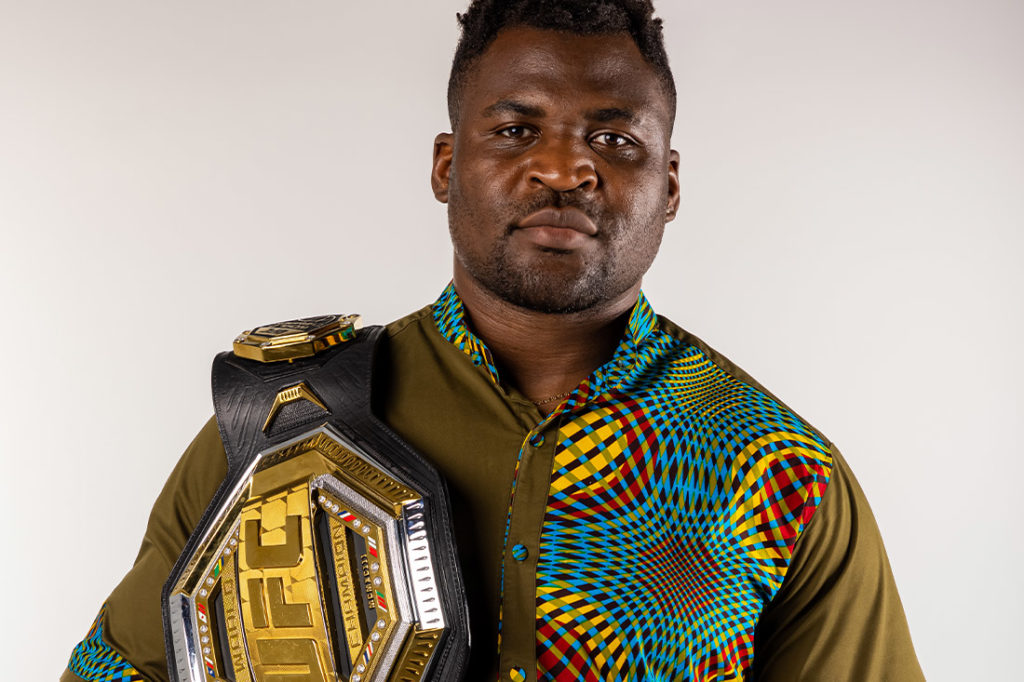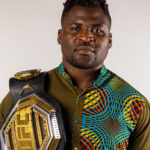Francis Ngannou can talk for a long time without bringing up the thing that he does for a living.
Ngannou’s job is to fight people until he or they are physically unable or unwilling to keep fighting. He’s arguably better at it than anyone else on the planet. As I write this, he is currently the reigning heavyweight champion of Ultimate Fighting Championship (UFC), the world’s premier mixed martial arts (MMA) league. But to whatever extent every 35-year-old’s life up to that point has been a journey, his has been something more epic, full of moments that would be turning points in the life of any person, and insurmountable challenges in the face of most.
A native of Cameroon in Central Africa, Ngannou first met serious adversity at age 6 when his parents divorced and he was sent to live with his aunt. His life was surrounded by the kind of poverty that can crush hope. At 10, he was working in sand mines in order to pay for school supplies. As a young man he made up his mind to go to Europe to pursue his dream of being a professional boxer. The continent didn’t want him; he risked his life to be smuggled across borders, he was robbed and thrown in a Spanish jail, all to make it to Paris where he lived homeless at first.
This was all just to have the opportunity to fight men who knock other men unconscious for a living. An interview with this particular competitor doesn’t really need to get into the specifics of MMA. Ngannou talks about his past and his future with an almost shy thoughtfulness, as if he is realizing with every new interview that his story is remarkable.
“For you it might be a story,” Ngannou tells SUCCESS. “But for me, it’s my life.”
I think any writer trying to put together a profile of someone listens to the subject talk, and some sentences naturally stand out as quotes that help illuminate something they didn’t already know about the person. They might jot them down in a notebook or bold them as they type. You can find out a lot about people who might warrant a profile just by typing their names into Google. But until you’ve heard them react to a question in a way that makes you feel like you know them better than their Wikipedia page, how could you possibly write something that warrants a reader’s time?
The problem with the quotes Ngannou gave us, which accomplished that level of intimacy, is the way they made me feel. You’ll read his words shortly, and you’ll react however you react. Ngannou now has exactly the life that he once dreamed of living, but as much as his story is one of hope, it’s also a story of acceptance that his former life—the one he escaped—simply couldn’t get any better where he was, and that’s something that I have trouble framing as inspirational.
No one should be made to feel the way that Ngannou felt during his formative years (let alone do the things he did to survive), and I’m hesitant to suggest that What Doesn’t Kill You Makes You Stronger, as if I have any right to justify his struggles. I’m also wary of suggesting that, considering all that Ngannou’s been through, surely you can overcome whatever small-by-comparison challenges are in your way, because it feels like a cheaply condescending way to sum up someone’s life.
But I just kept listening for that thing I felt comfortable labeling as inspiration. Please don’t misinterpret what I’m saying; I find nearly everything Ngannou said admirable, impressive and commendable, and eventually, I did find something that inspired me and that I believe you could apply to your own life.
I’ll try to tell you as much as I know. Maybe you’ll be inspired all along the way, too.

* * *
Plenty of young boys look up to their fathers. Francis Ngannou was no different. His dad was tough. He presented as someone who wouldn’t back down to anyone, and entering a world that a 5-year-old Ngannou could already tell looked harsh, who else better to lead you through life?
“My dad was my hero,” Ngannou says. “For me, he was the best man to ever exist.”
He was so young and he could only see things from the inside. Between his mother and his father, it felt like he had everything a child could need: love and protection. But his parents would soon divorce. He was sent to live with his aunt, but that didn’t last long. He was shuffled to various family members with good intentions, but they were struggling with their own poverty and raising their own kids, so Ngannou was treated like a burden they needed to shed after six months or so.
There are only so many concepts that a child can realistically comprehend as things that he possesses: a family. Routines or stability. A hero. And Ngannou had them all taken away. “I went from my little piece of heaven, which was my family, to see all that collapse and then deal with an entire world that was unknown to me, everything that wasn’t familiar to me.”
* * *
Five-year-olds don’t know all that much about what makes a hero.
Most of the things that Ngannou lost after his parents’ divorce were made fairly obvious to him by the absence of those things. But the thing he might have thought he would have been able to hold onto, the thing you’d think couldn’t be taken away from him, was his perception of his father.
That perception was confined to that slice of heaven. It was naive and clouded by what his father likely wanted his son to think of him. It wasn’t an accurate picture, and it hadn’t been exposed to reality.
Ngannou doesn’t get specific about what he learned about his hero, but he’s not particularly vague either. Among their village community, Ngannou’s father had a reputation for violence. To those who have a certain amount of fight inside them, there’s a fine line between toughness and anger, between being a protector and being a bully.
“He didn’t know how to handle things without using his punch,” Ngannou learned.
Taking a child away from what he knows is hard enough. But taking a belief away from that child when there’s so little he believes in the first place is disorienting. Ngannou was interested in competitive fighting from about as far back as he can remember, and his father was surely the original impetus for that. But fighting garnered his dad more disdain than respect.
“I remember at that specific moment, I made myself a promise not to have the same reputation as my dad, even though he was the guy that I loved,” Ngannou says.
It’s an almost unbelievable degree of awareness for a child to exhibit. It wouldn’t be the last moment of his past that he remembered so clearly. And it wouldn’t be the last of those moments that he followed up with a promise to himself.

* * *
Through these difficult early years, the young Ngannou developed a coping mechanism he called his “Future World.” It was escapism, but he tried to tell himself the far away world he was daydreaming of wasn’t some magical planet, but an ordinary life he would someday claim. It might only be a few minutes at a time, but everything was perfect; he had a family, he had a couple more pairs of clothes, he had enough food.
“As time goes by, that future world evolves. I think I still have a little bit of it now,” Ngannou says with an embarrassed laugh.
His actual existence was more grim. He was 10 when he started working in the mines, shoveling sand each day—a type particular to the region which is best suited for creating construction materials. He and many more pre-teens worked so they could afford what was needed to attend school. Ngannou has stated in interviews that he knows working in those mines made him physically strong, but it also robbed him of any bit of free time that he could have had as an adolescent. The teachers would kick him out of class for not having notebooks, pens and textbooks. He would return when he earned the money to buy what he was missing, but he would struggle to catch up to the lessons. Other kids treated him harshly.
“It wasn’t a great profile for a [potential] friend, so no one was excited to be a friend with that type of guy,” Ngannou says.
Another specific memory comes when he was 13. The Future Worlds weren’t enough and his sadness turned to anger. “I had been working for a couple years already in order to afford school supplies, and it still wasn’t enough,” he remembers. He was asked to leave class for not having the right book. “That day, something happened. I recounted my life and thought about everything that I’m doing, trying to figure out what I did wrong, and I didn’t see anything. The other kids didn’t deserve anything more than me.”
Ngannou describes this moment in great detail. He thought of the vacations he never went on. The weekends he didn’t enjoy. The luck that every other kid seemed to at least get the occasional taste of. He was barely a teenager, but he knew something had to change.
“I needed something extraordinary, so they could see me and realize that I wasn’t worthless,” Ngannou recalls thinking. “Everything that I did from there on was to make a point that I’m not worthless. I didn’t have a chance as a kid, but I didn’t deserve less.”
He was still set on avoiding his father’s reputation, but there was only one thing he imagined could make him extraordinary: boxing.
* * *
When Ngannou was young he would beat up banana trees like they were punching bags, and his foster parents would yell at him because they needed those bananas. He idolized Mike Tyson, but as a teenager there were no outlets for him to train. There wasn’t a boxing gym within 15 miles of him, and between school and the mine, he hardly had spare time anyway.
At 17, Ngannou dropped out of high school because he couldn’t consistently afford it. At 22, he became determined to pursue boxing. America had always been his dream (he’d nicknamed himself “San Francisco” because it was a big American city), but that would have to wait. Reaching the first stepping stone would prove hard enough.
Being smuggled to Europe from Cameroon was so perilous that it’s tough for Ngannou to look back on it. “We put ourselves in danger,” he remembers. “Today, when I think about some of that stuff that we went through to get to Europe, honestly, if you put me in that position today, I’m turning around. I’m not doing it.”
He was a different person then, driven by anger and a dream to have some control over his life for the first time. These weren’t the risks of someone who wanted more. These were decisions made by someone who wanted a life worth his existence. He was robbed along the way. He spent two months in a Spanish immigration jail after arriving on the continent.
“When I got to Paris, I was homeless,” Ngannou says. “But I think that was one of the biggest moments in my life when I was happy.” Opportunity doesn’t mean success or security or even remotely fair treatment. But to someone who had never had it, opportunity was everything.
He found a local fight trainer who convinced him to switch from boxing to MMA and let him sleep in his gym. He stayed in Paris and mastered the sport, developing the kind of power that turned heads quickly—UFC this year claimed that the 6-foot-4, 263-pound Ngannou is the hardest puncher in recorded history.
When he was 27 he participated in his first paid fight. At 29 he landed his first UFC contract.
In December 2015, Ngannou flew to Orlando for a fight. A Cadillac Escalade was waiting for him. The driver took his luggage and drove him to a Hyatt hotel. “That was the moment I felt like I made it,” he says with a big grin. It was his first time in the country he’d always dreamed of going to, and a complete contrast from his arrival in Paris.
Just over five years later, he is the sport’s champion and making millions of dollars every year. He says the night he won the heavyweight championship this past March, he imagined kids from his childhood back in Cameroon saying, “Actually he’s not bad.” He did something extraordinary just to prove that he had value.
* * *
The shattered image of his father’s reputation. The Future Worlds. The belief that his peers saw him as worthless. The obstacles he navigated. It’s not that I don’t find those things inspirational or would dispute that they made him stronger. It’s just that I don’t think it’s for me to say that his current success was worth all of that. There’s not a lot that’s worth a child feeling worthless.
What inspires me is how he uses his past to inform the belief in his future. Ngannou looks at what he’s been through matter-of-factly. He knows exactly what he’s capable of. He has the best kind of pride: the kind that makes him approach the rest of life with confidence instead of desperation.
“That’s how I know that I am a successful man, not because of what I have but because of where I’m at with my mindset,” he says.
He claims that he could go from the top back to the bottom and he would feel capable of navigating his struggles. “Obviously we always do our best,” he explains. “We don’t have control over what will happen. But what I do know is that I will overcome it.”
If you’ve seen Ngannou fighting, it’s hard to imagine someone taking his UFC Heavyweight Championship away from him, but it will happen eventually, because that’s the sport. The other competitors have bricks for fists, too, and one punch can end even a great champion’s night.
But he thinks of himself as more than a fighter, and whatever happens after his reign, good or bad, he’ll be calmly prepared for it. That’s inspiring to me.
“I will keep overcoming challenges,” Ngannous says. “That’s my title. That’s my trophy. Nobody can take that from me. I own that.”
This article originally appeared in the January/February 2022 Issue of SUCCESS magazine. Photos © Randy Raehnrich










